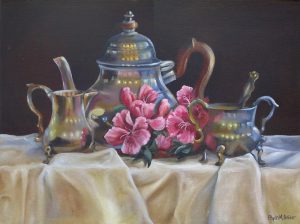She was mad with grief for the loss of her childhood, upset over some lost tea set, the decaying swing in the backyard, goldfish long dead. Inept, she was trying to live in this new body, trying to convince herself she was mature enough to marry.
She was not quite girl, not quite woman when she said “I do.” Her body was somewhere in limbo. She had a woman's hips and shoulders, a woman's confidence. But she had a girl's breasts and—most significantly—a girl's experiences. She knew it was time to marry, to have a home, a companion, a sense of direction. Still, her childhood swam temptingly in her memory like the goldfish her brother repeatedly replaced to amuse the cat.
So the summer she married, her fiancée found her ass-up in her closet, digging through the dross of her innocence, amazed at how tiny the chipped tea set now seemed, saucers missing, cup handles lying broken at the bottom of the box, mourning Barbies neatly buried in coffins of tissue paper and pink satin—all plastic-perky bosoms and thin waists, fake eternal smiles lighting their blue eyes.
As the day of her marriage approached, she grew more nostalgic for her youth. She even re-read all of her children's books, marveling at their thin spines, their mammoth print. Was it really time to put away childish things? Her new husband wanted pork chops for dinner, shirts ironed. He wanted long Sunday afternoon drives, bills paid.
When she thought of the years of routine ahead, this fishbowl life, she asked herself, "What is this insanity I have gotten myself into?" The horizon of her married life was the dark ceiling she stared at over her husband's heaving shoulders. Where was the woman who was supposed to lie in this bed and change the sheets come morning?
She was still somewhere in this half-matured body, waiting, circling back upon herself, the way goldfish swim ceaselessly for a shore unseen, unknown, mad with grief for the loss of what never was meant to last.
Beth Walker's poems have appeared in DeLuge, Light, and Rose Red Review, among others. She writes and publish frequently about women's body issues and imagery of violence. Most recently, her breast cancer poems appeared in the women's illustrated paperback anthology called BARED.

Williamsburg Stieff Tea Set by Phyllis Beiser